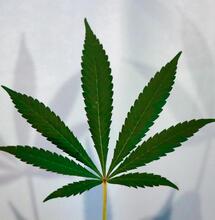Legal Cannabis Eating Profits of Drug Companies

The pharmaceutical industry is poised to lose billions of dollars in sales and stock value with nationwide cannabis legalization. A new study suggests that stock market returns of publicly traded pharmaceutical companies plunge up to 2% in the weeks immediately after a cannabis legalization event.
Researchers with the California Polytechnic State University and The University of New Mexico studied how the stock market returns of pharmaceutical companies performed over 25 years period between 1996 and 2019. The focal point of their inquiry? They wanted to find out what happened to drug companies in the days after a law legalizing medical or recreational weed was introduced. Their study concludes that a cannabis legalization event costs drug companies billions of dollars.
Both generic and name-brand drug manufacturers were affected by reduced stock performance, with manufacturers of brand-name drugs "suffering" slightly more so to speak than generic drugmakers.
Decreases in returns were observed following legislation on both medical and recreational marijuana, 10 days after introducing a law.
The researchers estimate that investors expect a single legalization event to reduce annual sales among drugmakers by a whopping $3 billion a year.
"Using a data set and estimation approach novel to health policy, we find evidence that investors predict legal cannabis access will significantly decrease sales of conventional pharmaceutical drugs. Legal cannabis applies competitive pressure to both generic and brand drug markets, across both classes of drugmakers," the researchers wrote. "This makes legal cannabis distinct from typical brand drug patent expiration and generic drug entry where typically only one drug, the drug coming off patent, and its substitutes are affected. Furthermore, cannabis cannabis can be purchased without a prescription and home cultivated, unlike any other conventional medication."
The researchers further elaborated that previous studies have shown access to legal weed reduces the consumption of some pharmaceutical drugs, such as highly addictive opioids. They also referred to other research that has correlated legal marijuana with reductions in consumption of other medications among specific patient populations like Medicaid recipients.
The legalization of weed is also likely to impact the performance of drug companies due to the various illnesses it can treat. Some of the uses of medical marijuana are well established in medical practice, most notably for pain treatment, seizures, mental health conditions, and among cancer and HIV patients.
Another factor that chips in is the high cost of pharmaceuticals, the researchers said. With cannabis legalization taking hold, high drug costs could be alleviated, allowing state and federal governments less fiscal strain as healthcare access improves.
Overall, the cannabis industry is becoming a significant new competitor in drug markets. Federal legalization will only cement its status, a move that might cost pharmaceutical sales a reduction of almost 11%. The researchers recommend that conventional pharmaceutical manufacturers compensate by investing in regulated cannabis market rather than lobbying against efforts to expand marijuana. Something similar to how tobacco corporations pivot as the recreational weed market grows in times when also interest in conventional tobacco goods reaches a historic low.











